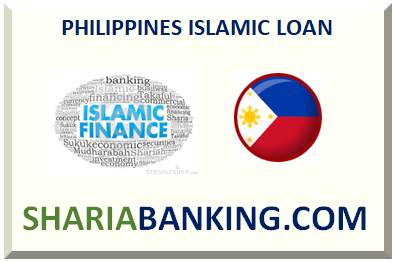
PHILIPPINES ISLAMIC LOAN ISLAMIC MORTGAGE 2024
FILIPINO ISLAMIC FINANCE PHILIPPINES CAR LOAN LEASING ISLAMIC MORTGAGE BUSINESS LOAN ISLAMIC BANK
In The Philippines, an Islamic loan in 2024 is by definition a halal funding facility that adheres to the principles of Islamic finance, which strictly prohibits the involvement of interest (Riba), instead of traditional interest-based lending, Filipino Islamic loanss employ alternative financial structures like Murabahah (cost-plus financing), Mudarabah (profit-sharing), Musharakah (joint venture), and Ijarah (leasing).
In The Philippines, an Islamic mortgage is a Shariah-compliant method of financing real estate purchases and not like the conventional mortgages that are based on interest payments, halal mortgages may utilize contracts like Murabahah, where the financial institution purchases the property and sells it to the borrower at a pre-agreed price including a profit margin.
In the Philippines, Islamic loans and mortgages have a particularly important role in providing ethical and religiously compliant financial options and for the Filipino Muslim community, these products enable engagement in financial activities without compromising Islamic principles.
In The Philippines, an Islamic loan in 2024 has the objectives that extend to promoting ethical and socially responsible financing and like Islamic mortgage, it is structured to encourage risk-sharing between the financier and the client, discourage speculative investments, and ensure that transactions contribute to equitable economic development.
What types of Islamic banking and investment options are available in the Philippines?
Islamic Banking and Investment Options in the Philippines
In the Philippines, Islamic banking and investment options are designed to comply with Shariah principles, offering ethical and interest-free alternatives. Here are some key options available:
- Islamic Savings Accounts: These accounts operate on a profit-and-loss sharing basis, in contrast to interest-based earnings in conventional savings accounts.
- Islamic Current Accounts: Similar to conventional current accounts but without interest. Often based on the principle of Qard (interest-free loan), where the bank guarantees the deposit.
- Murabahah Financing: A common financing method where the bank purchases an asset and sells it to the customer at a marked-up price, with the markup agreed upon in advance.
- Mudarabah and Musharakah Investments: Partnership-based investments where profits are shared according to pre-agreed ratios and losses are borne according to capital contribution.
- Sukuk (Islamic Bonds): Shariah-compliant bonds representing a share in an asset, service, project, or business investment, avoiding fixed interest payments.
- Islamic Leasing (Ijarah): Involves leasing assets in a manner that complies with Shariah, where the lessor retains ownership and the lessee benefits from the use of the asset.
- Takaful (Islamic Insurance): A cooperative insurance system where members contribute to a pool to guarantee each other against loss or damage, in accordance with Islamic principles.
HALAL MORTGAGE TAKAFUL INSURANCE STUDENT INSURANCE CAR INSURANCE ICELAND HOME INSURANCE REAL ESTATE INSURANCE LIFE INSURANCE BUSINESS INSURANCE TRAVEL INSURANCE HAJJ UMRAH INSURANCE FUNERAL INSURANCE MOSQUE INSURANCE AUSTRALIA INSURANCE GERMANY INSURANCE ISLAMIC CAR LOAN ISLAMIC MICROFINANCE WITHOUT INTEREST BUSINESS LOAN FOR WOMEN TAKAFUL MORTGAGE LOAN WITH POOR CREDIT ISLAMIC DEBT CONSOLIDATION DISABILITY LOAN STUDENT LOAN ISLAMIC LEASING LETTER OF CREDIT PERSONAL LOAN FOR STARTUP PRIVATE LOAN CROWDFUNDING CALCULATOR FOR WEDDING FOR EXPATRIATE ISLAMIC INSURANCE INDIA TAKAFUL ISLAMIC HEALTH INSURANCE USA TAKAFUL CANADA TAKAFUL UK TAKAFUL FARMER LOAN TAXI LOAN RAMADAN LOAN LIST OF ISLAMIC BANKS ALBANIA ALGERIA AUSTRALIA ISLAMIC COLLEGE SCHOLARSHIP BAHRAIN BANGLADESH BOSNIA-HERZEGOVINA BRUNEI CANADA CHINA DENMARK DJIBOUTI EGYPT ETHIOPA FRANCE INDONESIA IRAN IRAQ IVORY COAST JORDAN KAZAKHSTAN KENYA KUWAIT KYRGYZSTAN LEBANON LIBYA LUXEMBOURG MALAYSIA MALI MAURITANIA MOROCCO NETHERLANDS NIGERIA NORWAY FINLAND ISRAEL HONG-KONG GHANA RWANDA GAMBIA SIERRA-LEONE SOMALIA MYANMAR ANGOLA MAURITIUS OMAN PAKISTAN PALESTINE PHILIPPINES QATAR RUSSIA SAUDI-ARABIA SENEGAL SINGAPORE SRI-LANKA SUDAN SWITZERLAND SYRIA TAJIKISTAN TANZANIA CYPRUS JAPAN ARGENTINA BRAZIL AUSTRIA SOUTH KOREA MALDIVES WAKALAH WADIAH AMANAH SUKUK ISLAMIC CREDIT CARD WAAD ISLAMIC HEDGING MUSAWAMA MURABAHA QARD-UL-HASAN BAI-SALAM ISTISNA MUDARABAH IJARA IJARAH-THUMMA-AL-BA IJARAH-WA-IQTINA IJARA-MAWSOOFA-BI-AL-DHIMMA TAWARRUQ MUSHARAKA BAI-MUAJJAL-BAI-BITHAMAN-AJIL BAI AL INAH HAWALA KAFALAS RAHN THAILAND TUNISIA TÜRKIYE U.A.E UNITED-KINGDOM U.S.A UZBEKISTAN YEMEN AZERBAIJAN INDIA BELGIUM GERMANY IRELAND ITALY NEW-ZEALAND SPAIN SWEDEN BULGARIA KOSOVO SOUTH-AFRICA LONDON